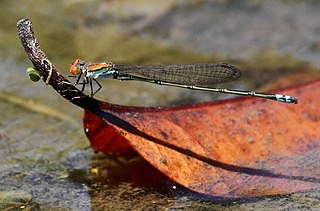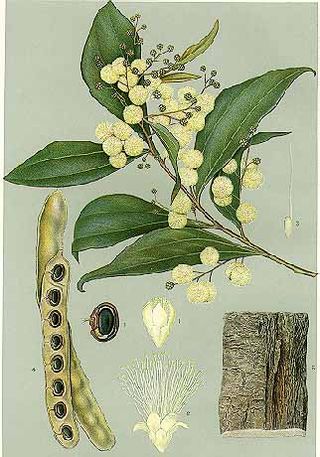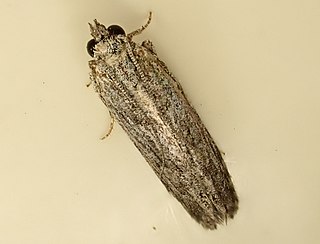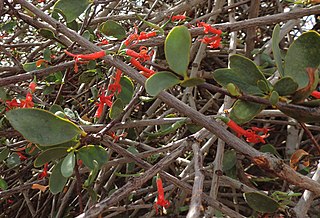
Acacia melanoxylon, commonly known as the Australian blackwood, is an Acacia species native in South eastern Australia. The species is also known as blackwood, hickory, mudgerabah, Tasmanian blackwood, or blackwood acacia. The tree belongs to the Plurinerves section of Acacia and is one of the most wide-ranging tree species in eastern Australia and is quite variable mostly in the size and shape of the phyllodes.

The Arabian gazelle(Gazella arabica) is a species of gazelle from the Arabian Peninsula. There are approximately 5,000 - 7,000 mature individuals in the wild.

The Yotvata Hai-Bar Nature Reserve is a 3,000-acre (12 km2) breeding and reacclimation center administered by the Israel Nature Reserves & National Parks Authority, situated in the Southern Arava near Yotvata.

Senegalia laeta, the gay acacia or daga, is a legume found in the family Fabaceae. It was formerly included in the genus Acacia.

The Arabian warbler, also known as Red Sea warbler or Blandford's warbler, is a species of Old World warbler in the family Sylviidae. It is found in Djibouti, Egypt, Eritrea, Israel, Jordan, Oman, Saudi Arabia, Somalia, Sudan, and Yemen. Its natural habitat is dry savanna country where it is often found in patches of Acacia.

Pseudagrion acaciae, the acacia sprite is a species of damselfly in the family Coenagrionidae. It is found in Angola, Botswana, the Democratic Republic of the Congo, Malawi, Mozambique, Namibia, South Africa, Tanzania, Zambia, and Zimbabwe. Its natural habitats are subtropical or tropical rivers and floodplains.

Acacia binervata, commonly known as two-veined hickory, is a shrub or tree that is endemic to eastern Australia.

Anarsia is a genus of moths in the family Gelechiidae.

Anarsia dryinopa is a moth of the family Gelechiidae. It is known from Australia and the warmer regions of New Zealand in both the North and the South Islands.

Wiltshirocossus aries is a species of moth of the family Cossidae. It is found in southern Spain, on the Canary Islands, as well as in Mauritania, Israel, Saudi Arabia, Bahrain, the United Arab Emirates, Yemen, Oman, Algeria, Tunisia and Egypt. The habitat consists of deserts and semidesert areas.
Anarsia balioneura is a moth of the family Gelechiidae. It was described by Edward Meyrick in 1921. It is found in Cabo Verde, Kenya, Malawi, Uganda and Zimbabwe.
Anarsia citromitra is a moth of the family Gelechiidae. It was described by Edward Meyrick in 1921. It is found in Mozambique, Kenya, Malawi, Namibia, Mauritius, Réunion, South Africa and Zimbabwe.

Anarsia isogona is a moth of the family Gelechiidae. In 1933, it was described by Edward Meyrick. It is found in Japan, China, Taiwan and southern India.

Anarsia ephippias is a moth of the family Gelechiidae. It was described by Edward Meyrick in 1908. It is found in India and Sri Lanka.
Anarsia acrotoma is a moth of the family Gelechiidae. It was described by Edward Meyrick in 1913. It is found in southern India.
Anarsia asymmetrodes is a moth in the family Gelechiidae. It was described by Kyu-Tek Park in 2014. It is found in Korea, where it has been recorded from the island of Baengnyeongdo.
Anarsia halimodendri is a moth in the family Gelechiidae. It was described by Hugo Theodor Christoph in 1877. It is found in Turkmenistan and Afghanistan.
Pseudonocardia acaciae is a Gram-positive bacterium from the genus of Pseudonocardia which has been isolated from roots of the tree Acacia auriculiformis in Bangkok on Thailand.
Mesorhizobium acaciae is a bacterium from the genus of Mesorhizobium which has been isolated from the nodules of the tree Acacia melanoxylon in Guangdong in China.

Plicosepalus acaciae, the acacia strap flower, is a species of hemiparasitic flowering plant in the family Loranthaceae. It is native to northeastern Africa, the Levant, and the Arabian Peninsula. As its common and scientific names suggest, it parasitizes acacias; Vachellia tortilis subsp. raddiana and V. t. subsp. tortilis. It seeds are dispersed by the white-spectacled bulbul.












